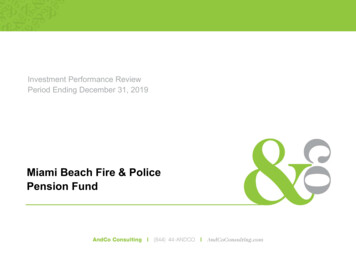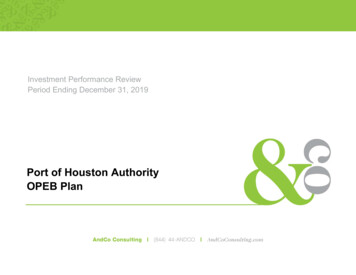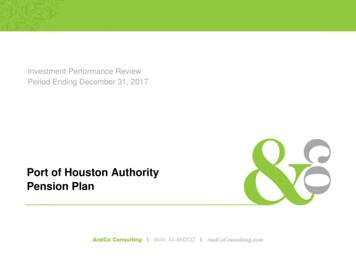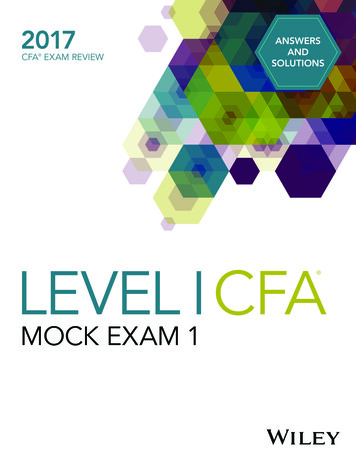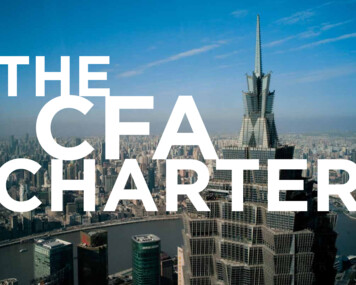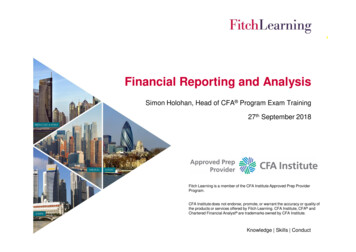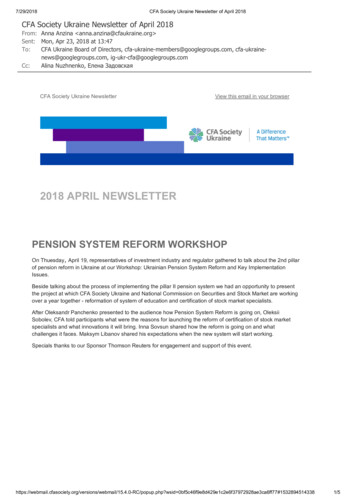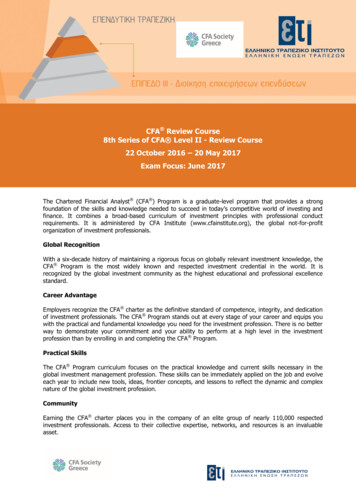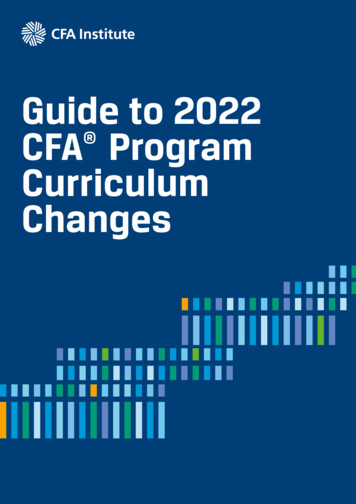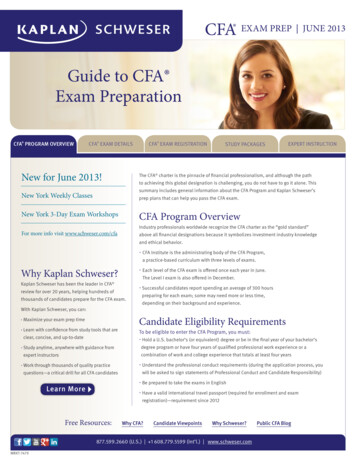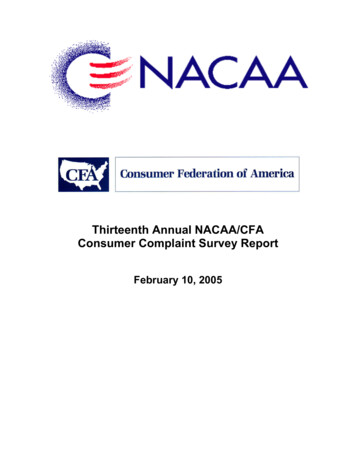
Transcription
Thirteenth Annual NACAA/CFAConsumer Complaint Survey ReportFebruary 10, 2005
Thirteenth AnnualNACAA/CFAConsumer Complaint Survey ReportTable of ContentsSummary3Top Ten Consumer Complaints for 2003-20044Consumer Complaint Trends Summary5Worst Scams and Big Cases of 2003-20047Identity Theft Complaints15Most Common Internet/E-Commerce Complaints16Consumer Problems Impacting Vulnerable Constituencies17Disaster Related Complaints for 2003-200419Needed Consumer Protections21Status of Consumer Protection Agencies23Survey Methodology27Appendix: Top Ten Consumer Complaints 1999-2004282
SummaryThe 13th Annual Consumer Complaint Survey Report was conducted by the National Associationof Consumer Agency Administrators (NACAA) and the Consumer Federation of America (CFA).Home improvement contracting was the top complaint category reported by state and localconsumer protection agencies during 2003-2004. For the past five years, home improvementcontracting has been listed among the top three areas of consumer complaints reported.Complaints about automobile sales ranked second followed by automobile repairs in third place.Credit-related complaints remained in the fourth spot, with debt collection and billing practices insixth place, indicating widespread consumer dissatisfaction with financing. Telecommunicationsproducts and services rounded out the top five categories of consumer complaints. Complaintsabout identity theft and fraudulent practices, telemarketing, Internet service and sales, and big ticketpurchases such as electronics and appliances rounded out the top ten consumer complaints.NACAA is a membership organization of consumer protection agencies represented by city, county,state or provincial levels of government. This report is based on 60 NACAA member responses toan electronic survey which posed questions about their most recent year’s complaint records.CFA is a non-profit association of 300 consumer groups, founded in 1968 to advance consumers’interests through advocacy and education. CFA joins with NACAA each year in surveyingconsumer complaints filed at NACAA member agencies across the nation since the annualconsumer complaint survey was initiated by both groups in 1992.3
Top Ten Consumer Complaints for 2003-2004Consumer agencies listed the top ten categories that generated the most complaints in 2003-2004.Rank1.2.3.4.5.6.7.8.9.10.TopicHome Improvement/RepairsAutomobile SalesAutomobile t Collections/Billing PracticesID Theft/Deceptive PracticesInternet/ ISP/E-CommerceMajor Purchases/Household GoodsTelemarketing/Sales Practices4
Consumer Complaint Trends Summary1. Home Improvement: In second place last year, home improvement contractor and repaircomplaints have consistently been listed within the top five complaint categories for the pastfive years. Typically high in years with numerous weather conditions affecting the nation’shomeowners, home improvement complaints usually include failure to use a written contract,abandonment or refusal to complete work, workmanship issues and noncompliance withbuilding code requirements. (See Appendix for past consumer complaint charts for 1999-2004.)2. Automobile Sales: Automobile sales have been consistently listed by consumer agenciesamong the top five complaint categories for the past five years. This category last appeared inthe number one spot in 2002. Automobile sales complaints took third place during 2001 afterholding first place for three of the past four years (2000, 1998, and 1997) and second place in1999.The automobile sales complaint category involves both new and used cars. Included are"Lemon Law" issues, financing/on the spot delivery issues, sales promotions and incentives,misleading advertising, undisclosed collision damage, extended service contracts and title andregistration issues, such as the inability to obtain permanent license plates.Used automobile sales complaints involve mechanical issues, warranty disclosures (including"as is" sales), misleading advertising, financing/on the spot delivery, undisclosed prior damage,title and registration issues, and terms and conditions of extended service plans.3. Automobile Repair: In third place last year, automobile repair complaints have consistentlybeen in the top five categories, holding the number three spot for three consecutive years.Typical consumer complaints involve problems with manufacturers or dealers, and issues withrepair (lemon laws), such as failure to repair correctly, cost overruns, and “ghost” repairs.4. Credit: Complaints about credit-related issues moved the category from a consistent 5th placespot to 4th place in 2002. NACAA agencies reported receiving complaints involving predatorymortgage lending, credit card fees, credit repair and reporting, payday loans and other forms ofextremely expensive small loans. Consumers reported that companies offered credit cards orloans but required consumers to pay “processing” fees up front. Consumers reported notreceiving the loan or credit card after paying the fees. (See report for further details.)5. Telecommunications/Cable/Satellite: For the first time, telecommunications providersrank in the top five for complaints filed with public agencies. This year’s category coverscomplaints with cell and landline telephone service, cable and satellite telecommunicationsservices. Problems that cause complaints include billing and contract provisions, extendedwarranty plans, fees for early cancellation or termination of services, “free time” disputes,roaming charges, and an emerging area - solicitation calls to cell phone numbers.6. Collections/Billing: As consumers gain greater access to their credit reports, they arediscovering incorrect credit reports and difficulties in correcting erroneous billing records.Consumer agencies and hotlines report rising numbers of complaints about fraudulent debts,5
including the practice of collecting time-barred or old debt. Nationwide consumer complaintsabout collections and billing moved the category from 9th place in 1999 to the 6th place thisyear.7. Identity Theft/Deceptive Practices: As a stand-alone category for this year, the categorycovers credit, financial fraud, correcting credit reports, employment /benefits fraud and utilitiesfraud. The number of consumer complaints in this category reported by member agenciesreflects the alarming increase in numbers of cases of identity theft and identity crime reportedto the Federal Trade Commission, and counted by Consumer Sentinel and the National FraudInformation Center, among others. So widespread is the practice of identity theft and relatedscams, such as phishing, that the issue now has a critical mass of public/private partners ingovernment, business and industry working to outline the steps necessary to report cases ofidentity theft and other deceptive practices using another person’s identity for fraudulentpurposes8. Internet/ISP/E-Commerce: Total number of complaints reported by NACAA agenciespushed the category’s rating from the 13-15th place in 2001 to its first time among the top tencomplaints last year and this reporting year with one-quarter of the respondents listingInternet/E-Commerce as a major complaint area. This year’s survey asked for details aboutInternet service providers as well as those about merchandise ordered on-line. Several agenciesreported more than 1,000 consumer complaints related to this category. (See report fordescription of Internet/E-Commerce complaints.)9. Major Purchases/ Household Goods: This category dropped from 2nd place to 7th after asteady rise for the past four years from 5th to 4th to 3rd to 2nd place. Household goods includebig-ticket items such as appliances, electronic equipment, home theaters, computers, homegyms, sporting equipment, furniture and other retail items. Complaints involved defectivegoods, failure to honor warranties, refunds and deceptive advertising.10. Telemarketing/Advertising Sales Practices: This year’s survey included several areas ofmarketing, telemarketing and advertising under this general category. Telemarketing was listedlast among 2000’s Top Ten and moved to the 7th position last year, and now has dropped to10th place. Included are deceptive advertising practices, mail order fraud, businessopportunities, telemarketing and buying services, and deceptive sales practices, such as baitand switch tactics. The drop in complaint standing this year reflects the success of severalstates that had already passed their own Do Not Call legislation as well as that of the FederalDo Not Call Registry in 2003.6
Worst Scams and Big Cases of 2003-2004This year’s survey asked respondents to describe their worst scams to illustrate the types of casesbrought to consumer agencies. These cases cover a variety of products and services. Several caseswere multi-jurisdictional actions by state attorneys general and federal agencies.HOME IMPROVEMENT CONTRACTORSA swimming pool contractor was the subject of a criminal investigation by Pinellas CountyFlorida Department of Justice and Consumer Services. The contractor was charged with 34felonies and 32 misdemeanors involving grand theft and unlicensed contracting. The contractor’smode of operation was to request a large deposit, start the job, and then delay completion. Somejobs were never started.New Hampshire’s Consumer Protection Bureau brought a case against a home contractoraccused of scamming consumers out of hundreds of thousands of dollars. Howard CountyMaryland, Office of Consumer Affairs reported consumer complaints about home repairs to 88new homes in the county.Orange County Florida’s Consumer Fraud Unit reported that an unlicensed Florida contractorwas accused of defrauding four victims, one of whom was a legally blind senior citizen. The“contractor” was sentenced to one year in prison, twenty years of probation, and required to makerestitution totaling 340,000 to all victims.Greater Lawrence Community Action Council, Inc. of Massachusetts reported a case involvinghome improvement contractors taking thousands of dollars from consumers for work promised andnever completed. Money was not refunded. The contractors were prosecuted and sent to jail.AUTO SALES AND REPAIRSNew Jersey’s Division of Consumer Affairs reported a case against Nissan North America, Inc.for failing to warn consumers that Xenon headlamps on 2002 and 2003 Maximas were beingtargeted by thieves and failing to alert owners and lessees that devices were available to preventtheft of the 1,800 lights. The State's complaint alleged that Nissan engaged in unconscionablecommercial practices and knowingly concealed, suppressed or omitted material facts to consumersin violation of the Consumer Fraud Act by, prior to November 2003, (1) failing to informconsumers purchasing 2002 and 2003 Maximas, as well as existing owners and lessees, of the riskof theft of the xenon headlamps, and (2) failing to inform owners and lessees of the cars of theavailability of the Anti- Theft Kit. The complaint also accused the company of engaging inunconscionable commercial practices by, prior to November 2003, failing to instruct its authorizeddealers or service departments to notify purchasers, owners and lessees of 2002 and 2003 Maximasof the availability of the Anti-Theft Kit, and by charging consumers for installation of the kit. TheState asked for restitution for affected consumers and civil monetary penalties. There are 35 dealersauthorized to sell new Nissan automobiles in New Jersey.
Florida’s Department of Agriculture and Consumer Services reported that 119 consumercomplaints have been filed against three brake repair locations in the Tampa Bay area alleging 'baitand switch' operations at the shops. The yearlong criminal investigation began in April 2003, whenlaw enforcement officers conducted 'sting' operations at three locations to determine whether thebusiness was in the practice of performing expensive and unneeded repairs. According to anaffidavit filed in support of the search warrants by an investigator with Office of Agricultural LawEnforcement, undercover officers were charged for unnecessary repairs after their vehicles werecertified by an experienced mechanic as being free of any mechanical defects just prior to drivinginto the shops. In each case, the undercover officers asked for the advertised 99.98 brake job whenthey entered the premises. Complainants were lured into the facility by the advertised pretense thatthey were going to get a complete brake job for less than 100. They wound up paying a muchhigher price and in some cases more than 1,000 for “brake repairs.”Colorado’s Economic Crime Division, 4th Judicial District Attorney's Office reported a caseinvolving owners of a local car dealership who stole approximately 650,000 of inventory andmoney. Over forty consumer complaints from purchasers of vehicles and motor homes alleged thatthe owners had not provided titles to lenders and/or purchasers after the purchase of vehicles. Theowners accepted trade-in vehicles and/or down payments from consumers against new vehiclepurchases. On a number of these purchase deals, the owner failed to use monies obtained throughthe creditors for these customers to pay off trade-in vehicle loans and/or pay the dealership creditcompanies for the newly purchased vehicles. 650,000 worth of inventory was discovered missingfrom the lot. Many of these vehicles were the secured property of creditors such as AutomotiveFinance Corporation (AFC). AFC alleged the dealer sold out of trust 640,000 of inventory andrefused to pay its obligations.IDENTITY THEFT/PHISHINGVirginia’s Soldier Family & Support Center at Fort Monroe reported investigating a case ofidentity theft of a soldier’s savings, checking and credit accounts across many states. The soldierwatched online as someone else depleted funds from his accounts.Santa Cruz’s District Attorney's Consumer Affairs Unit in California reported that SantaCruz county residents were being bombarded by phishing scams. Unidentified con artists werecalling on the phone and sending emails to consumers in an effort to obtain personal financialinformation. Phishing scams were targeted at registered voters. Some voters were getting calls fromsomeone claiming to be from the Registrar of Voters or the American League of Women Voters.The caller told the voter that there was missing information from their registration and asked themto confirm information including Social Security numbers and date of birth.HEALTH AND MEDICAL FRAUDWashington State’s Attorney General’s Office-Consumer Protection Division joined nineteenstates in a settlement with Medco Health Solutions, a pharmacy benefit manager that suppliestwenty percent of all prescription drugs sold in the country. Pharmacy benefit managers (PBMs)contract with health plans to process prescription drug payments to pharmacies. In the Medco case,Attorneys General contended that Medco withheld critical information on cost savings and receivedrebates for recommending that doctors and health care plans switch to the company’s preferred8
drugs. In the settlement, 20.2 million was to be divided among the participating states and used tobenefit low-income, disabled or elderly consumers of prescription medications.Washington DC’s Office of the Corporation Counsel reported a nationwide Consumer Protectionsettlement with Warner-Lambert Company, LLC (a wholly owner subsidiary of Pfizer, Inc., theworld’s largest pharmaceutical company) involving allegations of deceptive “off label” marketingof the drug Neurotonin. In settling this consumer protection investigation, Warner-Lambert will paythe District and 50 states a combined total of 38 million dollars. This settlement of state consumerprotection claims was part of a series of investigations by the National Association of MedicalFraud Control Unit and the US Attorney’s Office which lead to settlements of 430 million. Theconsumer protection investigation focused on alleged violations of state consumer protection lawswhen Warner-Lambert promoted Neurotonin for various “off-label” indications – including variouspsychiatric disorders, back pain and headache—even though the scientific evidence supporting theuse of Neurotonin for these indications was lacking. Among the methods allegedly used by WarnerLambert to deceptively promote Neurotonin for off-label indications were: continuing medicationeducation (CME) classes that lacked fair balance and misrepresented the nature of CME andprovided expensive perks to attending physicians; a publication strategy that subsidized theproduction and dissemination of anecdotal reports favorable to the off-label use of the drug andwere of no scientific value; providing payments to prescribers for “research” that were, in effect,kickbacks for off-label prescribing and providing incomplete information about Neurotonin to thedrug reference compendium “Drugdex.”INTERNET AND TELEMARKETING SCAMSArkansas Attorney General’s Office took action against an Internet service scam affecting 2,500businesses. Mercury Marketing, a Pennsylvania telemarketing company, was accused of chargingArkansas businesses for Internet access and other Web services that the businesses never requestednor authorized, adding charges of about 30 a month to phone bills received by the businesses.Typical victims were small entities such as auto-repair shops, pharmacies, pet kennels and funeralhomes. Arkansas officials got an injunction to stop the phone-cramming tactics and secured refundsand credits worth about 250,000 for victims.Ohio’s Office of Consumers’ Counsel (OCC) warned consumers in Ohio and across the nationabout a wide spread Internet dialing scam that resulted in hundred of dollars in international andunauthorized long distance charges. The residential utility advocate first alerted telephonecustomers to these scams in 2002 and had to reissue the warnings in 2004. The scams operate whileconsumers are surfing the web using local dial-up telephone numbers. While online, computers arebeing loaded with one or more programs containing viruses. These programs force a computer todisconnect the telephone line from the local dial-up number and reconnect to an expensiveinternational telephone number. Consumers may not recognize the problem until they receive thelong-distance portion of their telephone bill in the mail.The Louisiana Department of Justice reported enjoining US Grants and National Grants fromoperating a boiler room telemarketing operation selling free government grants with twenty-fivestations and a 3.5 million dollar annual income. A criminal prosecution is pending.9
DIPLOMA MILL SCAMAs a result of an investigation by the County of Los Angeles Department of Consumer Affairs, aprivate school charging students 450 to 1,450 for fake high school diplomas at the end of a 10week, 30-hour course was shut down and its executives were sued for misleading consumers. TheCalifornia Attorney General’s Office filed a civil lawsuit against California Alternative HighSchool (CAHS) and West Side Education Corporation (WSE), which bought the rights to operateCAHS sites. The lawsuit alleges that CAHS defrauded unsuspecting consumers, and it seeks fullrestitution for victims, civil penalties, and an order to permanently stop the defendants’ illegal acts.CAHS officials have said they have over 78 centers throughout the country, with at least 30locations in California. Students say CAHS officials wrongly told them that federal and stategovernments recognized the school, and promised them that the diploma would enable them to getinto college, find higher-paying jobs, and get financial aid.PREDATORY LENDING/CREDIT SCAMSWest Virginia Attorney General's Office/Consumer Protection Division reported enjoining aDelaware-based bank from further deceptive marketing of credit cards and abusive debt collectionpractices in the state. The bank under investigation is a sub prime credit card bank that marketscredit cards with high up-front fees and interest rates to consumers with bad credit. The orderprohibits the bank from debiting the accounts of consumers without their express authorization;making repeated telephone calls to consumers at home, at work or at other times or places known tobe inconvenient with the intent to annoy, abuse, oppress or threaten them; using profane or obscenelanguage, or other insulting or degrading conduct; falsely stating that a collection call is “urgent” oran “emergency” or using other deceptions to induce consumers to accept a call; and falselyrepresenting to the consumer that the bank will waive late changes or over-the-limit fees inexchange for partial payments on accounts. The case is expected to be heard in June 2005 inCharleston, West Virginia.Virginia’s Department of Agriculture and Consumer Services Office of Consumer Affairsreported car title loan companies that advertise loans secured by the title of a vehicle at only “1% aday,” despite Truth in Lending Act requirements that interest rates be advertised as an annualpercentage rate, or 365% in this case.Massachusetts’ Attorney General and the Commissioner of Banks announced that HouseholdFinance Corporation (HFC) agreed to pay an estimated 13 million to Massachusetts consumers andrevamp its business practices to settle allegations of predatory lending. The settlement, reachedbetween Attorneys General and banking and financial regulators from 44 states, the District ofColumbia and Household Finance, will return approximately 484 million to consumers across theUnited States - including more than 7,000 consumers in Massachusetts. The landmark settlement isthe largest in a consumer lending case in Massachusetts and believed to be the largest ever in a stateor federal consumer case. The investigation was prompted by complaints from consumers accusingHousehold of charging higher interest rates than promised, adding costly prepayment penalties, andproviding deceitful information about insurance policies. The Association of CommunityOrganizations for Reform Now (ACORN), a grassroots advocacy group with a focus onpredatory lending, also brought examples of Household's alleged practices to state regulators'attention. The Massachusetts Attorney General’s Office, the Division of Banks, along with stateAttorneys General and banking and financial regulators from 18 other states and the District of10
Columbia, began coordinating efforts early this year after identifying a pattern of complaints fromborrowers. This group was joined by 26 other states in making this announcement. The settlementprovides between 387.5 million to 484 million in restitution for consumers, depending on howmany states participate.Massachusetts joined the initial multi-state investigation with state Attorneys General and bankingand financial regulators from Arizona, California, Connecticut, Florida, Idaho, Illinois, Iowa,Michigan, Minnesota, North Carolina, New Jersey, New Mexico, New York, Ohio, Texas,Vermont, Washington, Wisconsin and the District of Columbia. The settlement includesHousehold International, Inc. (the parent company), Household Finance Corp., Household RealtyCorp., and Beneficial Finance Corp. Household is based in Prospect Heights, Illinois.Maryland’s Office of the Attorney General, Consumer Protection Division reported that 12.8million in restitution checks was mailed to 13,565 Maryland mortgage holders who are duerestitution under the State's 12.8 million settlement with Household International. The consumerpayment program stems from the landmark settlement, finalized in December 2002, betweenHousehold International and the attorneys general and banking regulators of all 50 states and theDistrict of Columbia. The settlement resolved an investigation by the states into allegations ofunfair and deceptive mortgage lending practices by Household International, which is one of thenation's largest sub-prime mortgage lenders through its subsidiaries Household and BeneficialFinance. The amount consumers will receive was determined by the specifics of their loan; thesmallest award was 106.51 and the largest 11,299, with the average award being 944.53.Cambridge Massachusetts Consumers' Council investigated complaints about a credit repairbusiness. Consumers alleged the company called consumers with poor credit and offered to sendthem credit cards for a 279 fee. Consumers received no cards, just credit repair information ofdubious value. The company refused to make refunds, so the cases were referred to U.S. PostalInspectors.Colorado’s First Judicial District Attorney's Office reported foreclosure scams involvingindividuals who get quitclaim deeds to properties in foreclosure and “rent out” the properties, thusdefrauding the secured creditor and misleading tenants with the option to purchase the property.PHONY INVOICE SCAMThe Canadian Competition Bureau investigation of 4,400 consumer complaints led to jail timeand fines totaling 915,000 against four Toronto-area residents for their involvement in the YellowBusiness Directory.com "phony invoice" scam. All four were convicted in April 2004 following afive-week jury trial in the Ontario Superior Court in Toronto. Two of the defendants were sentencedto three years in federal penitentiary and fined 400,000 each for violating the false or misleadingrepresentations provisions of the Competition Act. Another defendant received an 18-monthconditional jail sentence (including six months house arrest), 100 hours of community service and a 15,000 fine; and the final defendant received a nine-month conditional jail sentence (includingthree months house arrest) and a 100,000 fine. The individuals sent out mail pieces that falselyappeared to be bills or invoices from Bell Canada or the Yellow Pages, when in fact they weresolicitations to have the recipients' business details appear in Internet-based directories operatingunder the names Yellow Business Pages.com and Yellow Business Directory.com. Between Mayand December 2000, they sent mail to approximately 900,000 businesses and non-profit11
organizations in Canada and generated sales of over 1 million. The Competition Bureau receivedmore than 4,400 complaints about the phony invoices that asked recipients to send either 25.52 or 37.40 to a postal box in Toronto.UTILITY BILLINGCalifornia’s Public Utilities Commission (CPUC) reported consumer complaints regardingPacific Gas and Electric Company are billing practices. Consumers were back billed as a result ofdelayed or estimated bills. PG&E temporarily agreed to stop charging beyond the statutory threemonth period.Cingular Wireless was fined 12.14 million by CPUC for violation of laws governingtelecommunications carriers. It was found that Cingular had a corporate practice of prohibiting earlytermination of wireless service contracts unless the customer paid an early termination fee. Thecompany failed to provide a trial period.PERSONAL SERVICESVirginia Beach Virginia Office of the Commonwealth's Attorney Consumer Affairs Divisionwon an Assurance of Voluntary Compliance against a job listing service for misrepresentation ofjob availability, misleading statements about employment, relationships, salaries, and otherdisclosures.Springfield, Massachusetts’s Mayor’s Office of Consumer Information won full refundsthrough mediation for nine senior citizens who booked a “church club” trip to Hong Kong/Bangkokthat they cancelled due to the advent of the SARS epidemic in 2003. The Massachusetts travelagency initially refused to give consumers refunds then sent checks that were returned forinsufficient funds.Florida’s Broward County Consumer Affairs Division reported a large caseload investigating anarea towing company for overcharging more than 250 consumers.City of Alexandria Cable Television and Consumer Affairs Office in Virginia reported a highend carpet and rug cleaning and restoration company failed to return merchandise or moneys owedto consumers.FAILURE TO HONOR CONTRACTSFairfax County, Virginia’s Department of Cable Communication and Consumer Protectionreported investigating a series of complaints from consumers alleging a nationally-knownelectronics retailer sold defective goods then failed to honor extended service contracts.Virginia’s Department of Professional and Occupational Regulation (DPOR) investigated afor-profit cemetery company in Suffolk, Virginia, for a history of complaints about maintenance,financial improprieties, and even allegations of improper burial. After numerous unsuccessfulattempts to bring the cemetery into compliance, the Cemetery Board at DPOR revoked the cemeterycompany’s license.12
Massachusetts’ Consumer Assistance Council reported a freight company contracted withBrazilian consumers to move goods to Brazil. Goods never arrived; the business is now bankrupt.SHORT WEIGHT SALESCounty of San Diego (California) Department of Agriculture, Weights and Measuresannounced that Hydro Agri North America Inc. agreed to pay over two million dollars to settle acase brought by seven California prosecutors to resolve violations of consumer protection laws.The Company has agreed to pay civil penalties, investigation and prosecution costs, victimrestitution, in the total amount of two million twenty-nine thousand dollars ( 2,029,000) insettlement of a consumer protection law suit brought by a California prosecution team including theDistrict Attorney’s Office’s of Sonoma, Sacramento, Solano, Santa Barbara, Ventura, Fresno,and the City Attorney’s Office of San Diego.The settlement resolves violations of consumer protection laws that occurred when Hydro AgriNorth America packaged and distributed fertilizer in 50-pound bags that were short weight (i.e.:contained less than 50 pounds). Officials of the California Department of Food and Agricultureand San Diego County Weights and Measures agencies conducted a sta
The consumer protection investigation focused on alleged violations of state consumer protection laws when Warner-Lambert promoted Neurotonin for various "off-label" indications - including various psychiatric disorders, back pain and headache—even though the scientific evidence supporting the use of Neurotonin for these indications was lacking.
